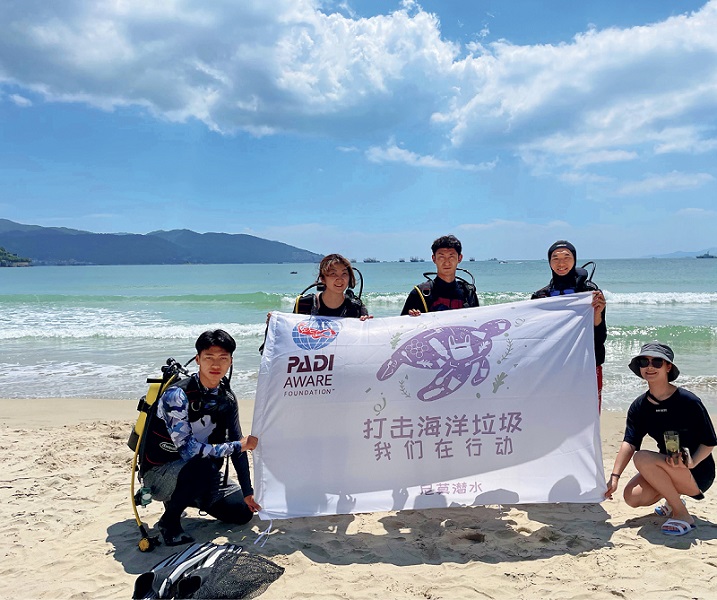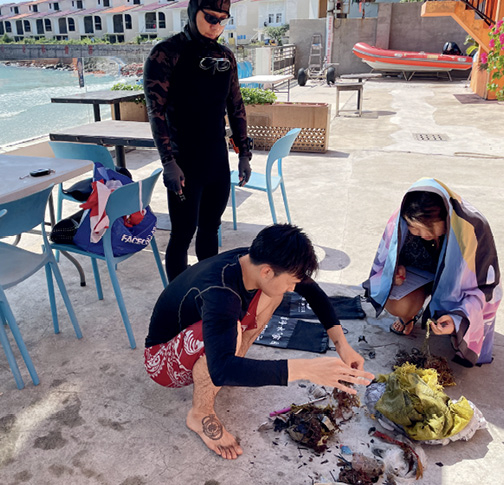Liu Qian is a diving instructor and an ardent volunteer for marine environmental protection. He has been to many tourist attractions around the world, such as the Nile River in Africa and the Red Sea lying between Africa and Asia. He turned his passion into a career, devoting himself to exploring deeper waters and sharing his knowledge and skills with more people in preserving the blue planet.

Guan Shanshan (left, second) takes a group photo with other volunteers after participating in the Dive Against Debris campaign initiated by Better Blue in Nan’ao, Shenzhen, in September 2021.
Preserving Marine Ecology
The community of volunteer divers in China has been expanding, according to Liu. Pilots, lawyers, doctors, and professors, people with high levels of education, well-paid jobs, free time, good awareness of environmental protection and basic knowledge, and a strong sense of social responsibility, constitute the mainstay of the group, Liu said.
A distinguished group in this community is Better Blue, an alliance for marine ecology conservation initiated in 2017. Its aim is to enhance marine conservation awareness among the public, involve more people in the conservation of endangered species and their habitats, and inspire more people to care about ocean development in a more friendly way.
A major focus of its work is to help the general public realize that littering plastic rubbish in the ocean would cause long-term damage to the marine ecology. “The plastic rubbish that flows into the ocean live longer than humans,” said Liu, who joined the alliance in 2019. All rivers flow into the sea and the endpoint of all water systems on the Earth is the ocean. Rubbish from the land will end up in ponds, lakes, and rivers, and eventually in the sea. “If we pick up the garbage while it is on land, we can prevent damage to the ocean,” he said. “The cost of cleaning up the land is much lower than removing rubbish from the ocean.”
“The corals in the Red Sea have retained their bright colors and when diving at night, you can see the nocturnal lobster in the water,” Liu said. “It’s beautiful.” This has been possible because countries around the Red Sea are less economically developed, and the pollution is, therefore, less serious and the marine biodiversity remains relatively intact.
The experience has helped Liu understand that human action can make a difference. “I’m doing a meaningful job,” he said.
Beach Cleanup
Guan Shanshan is another volunteer with the organization. In 2019, she took part in a beach cleanup activity in Nan’ao, southeast China’s Shenzhen. It was the first time she had participated in an activity of this sort.
“I saw sea turtles suffocating from taking in plastic and fish struggling with fishing nets. I feel we have a responsibility to take immediate action to protect marine life and the environment,” Guan said. Seventy percent of the earth’s surface is covered by water, and the earth is actually a blue planet. “But this beautiful underwater world has become polluted by the white garbage we throw into it,” she added.
Liu elaborated on the long-lasting damage caused by plastic waste as it takes ages to degrade, usually up to 200 to 400 years, and sometimes over 500 years. “That is to say, after we leave the world, the garbage we threw into the ocean will still be there, continuing its damage during the lifetime of our descendants,” he said.
While it’s easier to dispose of plastic rubbish on land by burying it, plastic refuse in the ocean causes more serious problems. Every year, 12 million tons of plastic waste flow into the ocean. Marine fauna may directly ingest it or get entangled in it, leading to the danger of choking, deformities, and even extinction. Even humans on land are impacted ultimately. “The fish we eat may contain plastic particles,” he added.
A beach cleanup drive by Better Blue in August 2022 saw volunteers in Shenzhen collect nearly 1,000 pieces of garbage, most of which was plastic and foam plastic. Videos of the drive were widely disseminated on social media, calling on more people to join in. “Minor acts can save the ocean, and this is what we hope to do,” said Liu.
Dive Against Debris
Dive Against Debris is another initiative by Better Blue to protect the ocean that calls for greater skills. “Diving skills are a basic requirement for reducing marine debris,” Liu said. In this project, divers go into the waters and fish out garbage, which is then sorted. They do this at several fixed locations in the bay area of Shenzhen every month. The work also involves noting the type of garbage prevalent in the area and its volume, and then analyzing the reasons and making targeted suggestions to reduce the pollution.
They have found a plethora of garbage, including food packaging bags, mineral water bottles, fishing gear, and even fish cages. More than 80 percent of the garbage is plastic waste which decomposes into plastic particles and is spread farther with tides and waves. Eventually, they enter the bodies of marine organisms, and then human bodies.
The data the volunteers collect can help local governments make decisions on investment in marine environmental protection, and research institutes study marine species and ways to restore the marine ecology.

Guan Shanshan (right, first) and other diver volunteers are sorting through marine waste they collected in the ocean.
Spreading Knowledge About Ocean
On the eve of Mother’s Day in 2019, Better Blue paid tribute to the mother of all living beings, Mother Earth. It organized public screening of a documentary, A Plastic Ocean, to raise awareness about the perils of plastic waste. The documentary film was produced by two explorers and a team of international scientists in 2016 after four years of shooting in more than 20 locations. It focuses on the causes and consequences of plastic pollution and offers feasible solutions to preventing the catastrophes. The intention behind the screening of the documentary in Shenzhen was to show the audience the importance of ensuring the survival of Mother Earth, who nurtures myriads of new lives every day.
Marine protection is not limited to collecting debris or cleaning up beaches. It also includes coral reef surveys, coral restoration, training of professional divers, public awareness raising, and marine conservation education.
On weekdays, Liu volunteers to give lessons on marine conservation in local primary and secondary schools. “We teach marine science to make children realize that land-based garbage can also pollute the ocean,” Liu said. Researchers from the South China Sea Institute of Oceanology of the Chinese Academy of Sciences also chip in, giving public lectures on coral science and protection of the species.
Everyone can participate in environmental protection in their daily lives. All they need to do is to follow the 5R principle of waste management: reject, reduce, reuse, recycle, and rot. It involves simple things, such as rejecting straws while drinking cold drinks, reducing takeout orders, using fewer plastic food containers, and having less bottled drinks. It also means reusing environmentally-friendly items, such as cloth bags instead of plastic bags. Rot means letting biodegradable kitchen waste degrade naturally.
People are showing great enthusiasm for activities organized by Better Blue, signing up in droves. Before the pandemic, Better Blue organized film screenings and science popularization activities almost every weekend in libraries or cafes. The participants ranged from kindergarten children to people in their 70s. Today, with scuba diving becoming popular, diving enthusiasts are coming with their own equipment, diving into the waters, getting to know the underwater world and protecting it.